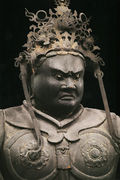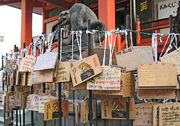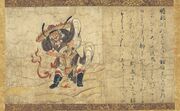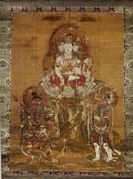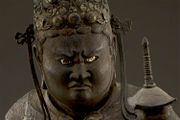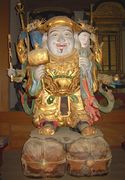Bild:Tohachi hanabusa.jpg: Unterschied zwischen den Versionen
Zur Navigation springen
Zur Suche springen
| Zeile 8: | Zeile 8: | ||
|material= Seide, Farbe, Gold<!-- , Papier, Holz, Metall, Stein, Bronze, bemalt, vergoldet, Tusche ... --> | |material= Seide, Farbe, Gold<!-- , Papier, Holz, Metall, Stein, Bronze, bemalt, vergoldet, Tusche ... --> | ||
|maße= <!-- 25,5 x 19,1 cm ... Höhe: 30,2 cm --> | |maße= <!-- 25,5 x 19,1 cm ... Höhe: 30,2 cm --> | ||
| − | |artist= Hanabusa Ikkei | + | |artist= Hanabusa Ikkei |
|artist_dates= <!-- 1421–1482 --> | |artist_dates= <!-- 1421–1482 --> | ||
|periode= <!-- Heian-Zeit Kamakura-Zeit Edo-Zeit --> | |periode= <!-- Heian-Zeit Kamakura-Zeit Edo-Zeit --> | ||
| Zeile 26: | Zeile 26: | ||
| − | + | Zu Hanabusa Ikkei 英一珪 schreibt das British Museum: | |
Ikkei was the leader of the Hanabusa school, and offshoot of the Kano school, founded by Itcho in the early 18th century. He gives his age as eighty-one (dating the painting to 1829) and says he is copying an image from Tomon-in Temple, Moriyama in Omi Province. Further documents suggest that the painting was commissioned by one Nagaoka Yasushige and dedicated at the New Year, 1832 by Nikkyo Shonin of Ikegami Hommon-ji Temple, Edo. | Ikkei was the leader of the Hanabusa school, and offshoot of the Kano school, founded by Itcho in the early 18th century. He gives his age as eighty-one (dating the painting to 1829) and says he is copying an image from Tomon-in Temple, Moriyama in Omi Province. Further documents suggest that the painting was commissioned by one Nagaoka Yasushige and dedicated at the New Year, 1832 by Nikkyo Shonin of Ikegami Hommon-ji Temple, Edo. | ||
}} | }} | ||
Version vom 29. September 2014, 20:44 Uhr
Bildseite:Tōhachi Bishamonten
- Hängerollbild (Seide, Farbe, Gold). Werk von Hanabusa Ikkei, 1832. The British Museum. Letzter Zugriff: 2012/2/18
Bishamon mit vier Köpfen und zwölf Armen, die acht Schwerter eine Pagode, ein Juwel, eine Sutrenrolle und einen Vajra halten. Er reitet auf einem Löwen und hat einen Löwenhelm, auf dessen Spitze ein Buddha thront. Dahinter das „Rad der Lehre“ mit acht Speichen.
Zu Hanabusa Ikkei 英一珪 schreibt das British Museum:
Bildverwendung:
- Bishamon-ten: Wächter und Glücksgott (Kapitel „Essays“)
Dateiversionen
Klicken Sie auf einen Zeitpunkt, um diese Version zu laden.
| Version vom | Vorschaubild | Maße | Benutzer | Kommentar | |
|---|---|---|---|---|---|
| aktuell | 22:37, 23. Feb. 2012 |  | 545 × 800 (79 KB) | Bescheid (Kommentar | Beiträge) |
:
Dateiverwendung
Die folgenden 10 Seiten verwenden diese Datei:
